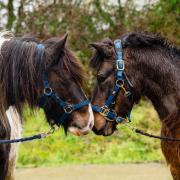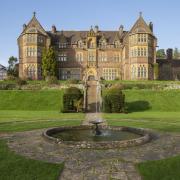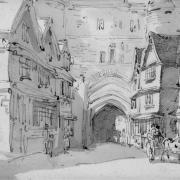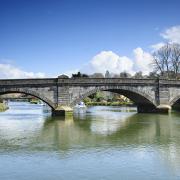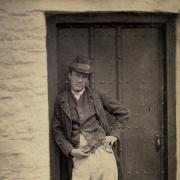Rising levels of river pollution are a cause for concern, but small teams of citizen scientists in North Devon are on a mission to protect their local waterways by learning the skills needed to monitor water quality. People power can make a difference it seems.
Until recently, Peter Jones didn’t know his turbidity tube from his phosphate strip. Nowadays, he carries these scientific bits of kit around when he walks along the Little Dart near his home in Rackenford
Peter is one of around 30 volunteers who have signed up to take water quality measurements from the rivers and streams in this part of the county.

It’s part of a citizen science project run by the Westcountry Rivers Trust, which calls on people to take an active interest in their local waters.
As a regular open water swimmer, angler and surfer, Peter says he has often been far too up close and personal to the problem of pollution and wanted to do something about it.
‘I’m passionate about watersports in general and it’s apparent that the situation is becoming worse,’ says Peter. ‘You see it when you’re walking along streams, the foam, the indications of pollution.
‘The Little Dart flows through the majority of my ward and it was really clear to me that lots of people have the same concerns.’

As an Independent district councillor, Peter knows water pollution is a political hot topic but, for him, it goes deeper than that.
‘We’ve got some of the most beautiful rivers in the country and the reality is, some of them get polluted. We should all be taking care of our natural environment. For a region like North Devon, our rivers and streams and beaches are so vital to us as who we are.’
At the end of last year, Peter found out about a training day the Westcountry Rivers Trust was running in Braunton and put the word out among his fellow district councillors, neighbours and friends.

More than 30 volunteers gathered at the Braunton Countryside Centre to find out how to get involved in water testing, including safety guidelines, sending off for the right kit and carrying out surveys.
‘Everyone was really enthusiastic and interested in understanding and participating,’ says Peter, who recently received his water quality kit, which includes pots of phosphate strips and a turbidity tube to measure the optical clarity of the water sample. There is also a total dissolved solids (TDS) probe. Harmful pollution from things such as sewage and slurry will usually elevate a TDS reading.
Each volunteer is also given a log-in to a database where they can record their findings.
‘The aim is that people will test a minimum of once a month but we’re trying to encourage weekly or even twice a week,’ adds Peter. ‘If everybody just does a little bit... we can bring about real change.’

They’re already on it in Ilfracombe.
‘I’m looking at my local river in a different way,’ says Sara Wilson, who has been out testing the waters near her home in the coastal town. Sara, also a district councillor, has done the training, received her kit and strategically chosen two sites on the East and West Wilder brook.
She has teamed up with three other volunteers in her area and monitors her patch at least once a month.
‘Like a lot of people, I’ve been seeing on the news stories about the state of Britain’s rivers and I just think, it’s such a backward thing to be happening,’ says Sara, explaining that for many people, waterways are part of the daily routine.
‘Rivers are so personal. You often see them when you’re out walking in the countryside or in the park.’

Sara is now a much more observant passer-by, even when she hasn’t got her testing kit handy.
‘I’m always looking at what’s on the side of the river, whether it’s flowing fast, what wildlife is visible,’ she says. ‘It does make you look at it differently.
‘The outcome from that training day in Braunton is that we can do something - we can be local guardians of our river.’
Sara, a Green Party councillor, says the project is a way to bring people together over an issue that affects us all.
‘It’s ordinary people making a difference,’ she adds. ‘It’s not posturing or expressing an opinion. It’s using science.’
Volunteers are now regularly testing the Little Dart and other rivers in the region, including the Taw, Bray, Mole and East Lyn, as well as streams and brooks.

There are plans to include estuaries and the coast later on this year. All the results are being recorded on the ‘Cartographer’ website, where the information is publicly available on interactive maps.
When 12 or more surveys are taken over a year, a scorecard is produced for the catchment, which provides a summary of the overall state of the water body.
But as well as all the facts and figures and science and turbidity tubes, by collecting data, people are naturally engaging with their environment - a positive outcome this project is keen to encourage.
‘By building bonds to nature on our doorstep, we develop a love for these spaces and a desire to care for them,’ says Doug Munford, resilience and communities programme manager at Westcountry Rivers Trust. ‘There are more than 850 water bodies across the Westcountry to be monitored, which means people don’t need to go too far from home to take part.
‘Our citizen science volunteers are vital to the creation of an on-going picture of the health of the region’s rivers.’
The plan now is to organise another training course in North Devon to try to recruit more locals to the cause.
‘It’s quite easy to make it a part of your normal activities,’ says Peter. ‘A lot of our volunteers are including testing as part of their dog walk. So many people are connecting with their local rivers and we’ve only just started. It’s really exciting.’
wrt.org.uk








